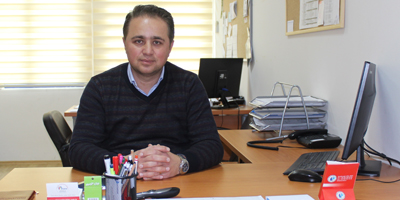EUL Academician Bakırhan Attracted Attention to the exercise approaches in cancer patients
European University of Lefke Faculty of Health Sciences Department of Physiotherapy and Rehabilitation academician Assoc. Prof. Dr. Serkan Bakırham gave information about the exercise approaches in cancer patients.
Bakırhan stated that today, cancer treatment requires multidisciplinary team approach with different duties and authorities such as surgeon, radiologist, oncologist, physiotherapist, nurse, nutritionist, psychologist, and psychiatrist. Bakırhan said that, “In this team, physiotherapists have very important duties in evaluating the functional abilities of the patients, giving the proper exercise program and increasing the quality of life of the patient by using exercise and specialized treatment methods in the musculoskeletal system involvement which may be due to pain in the cancer patient, fatigue and immobility due to the prolonged effects of the disease”.
Bakırhan; “With lymph-edema treatments, we are able to increase significantly the functional activities and the quality of life of patients in daily life.”
Bakırhan pointed out that in the treatment programs of physiotherapy and rehabilitation planned by physiotherapist, the phases of the cancer patient are taken into consideration and added that appropriate interventions and training of the patient are provided to reduce the effects of insufficiencies that may occur in the protective or preventive phase in cancer patients. As an example Bakırhan said that pre-operative breathing exercises, exercise programs for general physical functioning and improvement of health conditions are planned and implemented in patients who will undergo surgery for cancers. Bakırhan pointed out that it is aimed to eliminate and overcome the problems related to illness or treatment within the restorative phase, and to maintain normal functional levels and daily life activities. Bakırhan said that, “For example, with the providing lymphadenopathy treatments for patients with edema or swelling that can develop in the hands and wrists in patients who have received lymph nodes from the axillary region after breast cancer, we can ensure the relaxation of functional activities of patients, better use of arms and a significant reduction in pain”.
Bakırhan pointed out that with the head and neck and shoulder region exercises that are given after the head and neck surgery, it is aimed to keep the level of independence of patients in the supportive phase at the maximum level, to maintain relaxation in the neck region of the patients and to prevent of movement limitation. Bakırhan stated that assistive devices for home mobilization and self-care activities are taught to the patient and the family by physiotherapists to help mobilize and maintain transfers to avoid functional losses and added that complications that may occur in the terminal phase of a palliative or cancer patient are trying to be prevented. Bakırhan stated that the common pain experienced during this period stems from long-term inactivity and added that psychosocial support is provided to the patient and his / her family while trying to prevent injuries.
Bakırhan said that “The long-term goal of physiotherapy and rehabilitation is to increase the quality of life in the cancer patient and to maintain the functional level at the highest level,” and added that with this aim a physiotherapist directs the cancer patient to sportive, physical and recreational activities. Bakırhan stated that with strengthening and endurance exercises suitable to respiratory, relaxation, physical levels of the patient, they contribute to the treatment of cancer patients.

